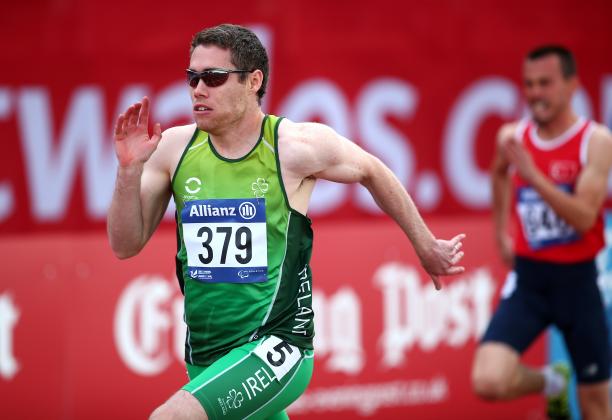World’s fastest Paralympians ready to break new records
06.09.2016From Jason Smyth and Jarryd Wallace to Omara Durand and Tatyana McFadden, athletes around the world are gunning for new world records in Rio.
 Jason Smyth at Swansea 2014
© • Getty Images
Jason Smyth at Swansea 2014
© • Getty Images
World records are there to be broken – and in the 100m sprints, history proves that the world’s best Para athletes just keep getting faster. But how fast will they go at Rio2016?
If past performances at previous Paralympic Games are anything to go by, world records are definitely on the cards over the 10 days of action starting on Thursday (8 September).
Ireland’s visually impaired sprinter Jason Smyth – the fastest Paralympian on the planet – has lowered the 100m T13 at the last two Games.
At Beijing 2008 he won gold with what was then a new world record 10.62; at London 2012 he smashed the record once more, clocking 10.46.
The 29-year-old has acknowledged he is in great form already this year – he tops the world rankings with 10.45 clocked in Clermont, USA, in April and ran 10.39, his fastest since 2013 – at a non-IPC ratified event earlier in the season.
Then there’s the men’s 100m T43/44. In the T43 class, Brazilian Alan Oliveira is the current world record holder with a time of 10.57.
In the six years between 2007 and 2013 the record dropped by a phenomenal 0.34 seconds. Over a similar time period, the IAAF men’s 100m world record has gone from 9.77 to 9.58 seconds – 0.19 seconds faster.
The men’s 100m T44 class reveals a similar evolution, from 10.91 clocked by the USA’s two-time Paralympic champion Marlon Shirley in 2007 – the first amputee sprinter to break the 11-second barrier – to 10.61 clocked by the USA’s Richard Browne at last year’s IPC Athletics World Championships.
The world record changed hands four times during that period. Indeed, in the 12 months from July 2012 the record fell three times.
First, in July 2012, Great Britain’s Jonnie Peacock clocked 10.85; then Browne managed 10.83 at the 2013 World Championships, only to take another 0.08 seconds off that time three weeks later.
The USA’s current number one Jarryd Wallace held the 100m T44 world record for just over two months last year, defending his Parapan Am crown with a 10.71 run in Toronto, Canada. Browne knocked 0.1 seconds off that time when he won the world title last October.
Wallace opened his 2016 season with a wind assisted 10.57 in early April at the Spec Towns Invitational in Athens, Georgia. When it comes to world records in Rio, the 26-year-old undoubtedly remains one to watch.
The women’s Para sprints tell a similar story.
In the 100m T12, French Para athlete Assia El Hannouni won gold at Athens in a world record 12.32. At London 2012, China’s Guohua Zhou knocked 0.41 seconds off to become the fastest female Paralympian in the world – a status she held until 2015.
Now it’s the turn of Cuban sprinter Omara Durand to take centre stage. The 24-year-old triple world champion knocked 0.26 seconds off Zhou’s mark on her way to Parapan Am gold last year, then went even faster at Doha 2015, crossing the line in 11.48. In 12 years, the women’s 100m T12 best has improved by nearly one second.
Since 2008, the women’s 100m T38 world record, which then stood at 13.43, has been lowered eight times; Great Britain’s Sophie Hahn has been responsible for four of those achievements – at the World Championships in 2013, and then in 2015 when she clocked 12.60. Can she do it again at her first ever Paralympic Games?
Finally, the women’s 100m T54. At London 2012 China’s Wenjun Liu raced to gold with a world record of 15.82, and she lines up in Rio against the current world record holder, US star Tatyana McFadden.
The American set the current mark of 15.35 just three months ago. With a target of seven gold medals at Rio 2016 and the 100m T54 the first of her goals, it would be no surprise if the world record was lowered once again.





















